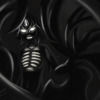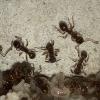- Formiculture.com
- Forums
- Gallery
- Members
- Member Map
- Chat

Some concerns about my lasius niger queen
Started By
Paganistic_emperor
, Sep 21 2019 7:43 PM
3 replies to this topic
#1
 Offline
-
Posted September 21 2019 - 7:43 PM
Offline
-
Posted September 21 2019 - 7:43 PM
Hello!
So I’ll cut right to it I suppose. I recently bought a lasius niger queen through AntsCanada (mainly cause I live in the city and rarely If ever see ants during their mating flights) and I have a few concerns. Firstly it came with a queen 5 workers and no brood, which was a red flag to me but I didn’t think about it until on my way home. Now it’s been a week where they’ve been mostly undisturbed but she still hasn’t laid any eggs. Thirdly when I did check on her earlier today she seemed rather weak, barely moving. Which could be completely normal but this is my first time doing it so I’m rather in my head about it haha. I’m aware that she may not lay until after hibernation, which if this is the case should I provide her with food? Any help or advice is appreciated.
So I’ll cut right to it I suppose. I recently bought a lasius niger queen through AntsCanada (mainly cause I live in the city and rarely If ever see ants during their mating flights) and I have a few concerns. Firstly it came with a queen 5 workers and no brood, which was a red flag to me but I didn’t think about it until on my way home. Now it’s been a week where they’ve been mostly undisturbed but she still hasn’t laid any eggs. Thirdly when I did check on her earlier today she seemed rather weak, barely moving. Which could be completely normal but this is my first time doing it so I’m rather in my head about it haha. I’m aware that she may not lay until after hibernation, which if this is the case should I provide her with food? Any help or advice is appreciated.
#2
 Offline
-
Posted September 22 2019 - 1:59 AM
Offline
-
Posted September 22 2019 - 1:59 AM
i am not experienced, so take others advice above mine. but i think i can give some info here based on my research.
firstly, as far as i know, the vast majority of queens barely move once they have found a nesting place. this is almost guaranteed to be the case with a fully-claustral queen like Lasius niger.
second, Lasius niger does indeed hibernante. most ants, to my awareness, only need to be given water during hibernation, and do not drink or eat much, if they eat at all. they will also hibernate even despite climate or conditions. my personal suggestion would be to keep her and her workers in a cool, dark place and check on them every couple of days or so. if it is like you say, and you have received her during hibernation season, then yes. she will absolutely reduce or stop laying eggs.
if someone could come in and experience-check all of the garbage i just said that would be appreciated, lmao.
Edited by P0rcelain, September 22 2019 - 2:00 AM.
- Antennal_Scrobe likes this
#3
 Offline
-
Posted September 22 2019 - 3:11 PM
Offline
-
Posted September 22 2019 - 3:11 PM
i am not experienced, so take others advice above mine. but i think i can give some info here based on my research.
firstly, as far as i know, the vast majority of queens barely move once they have found a nesting place. this is almost guaranteed to be the case with a fully-claustral queen like Lasius niger.
second, Lasius niger does indeed hibernante. most ants, to my awareness, only need to be given water during hibernation, and do not drink or eat much, if they eat at all. they will also hibernate even despite climate or conditions. my personal suggestion would be to keep her and her workers in a cool, dark place and check on them every couple of days or so. if it is like you say, and you have received her during hibernation season, then yes. she will absolutely reduce or stop laying eggs.
if someone could come in and experience-check all of the garbage i just said that would be appreciated, lmao.
That is all true, as far as I know. What's more, the fact that worker ants live only two weeks is a LIE. Workers often live over a year, sometimes more. You don't need to worry.
Currently keeping:
Tetramorium immigrans, Pogonomyrmex occidentalis
Myrmica punctiventris, Formica subsericea
Formica pallidefulva, Aphaeogaster cf. rudis
Camponotus pennsylvanicus
Camponotus nearcticus
Crematogaster cerasi
Temnothorax ambiguus
Prenolepis imparis
#4
 Offline
-
Posted September 25 2019 - 4:33 AM
Offline
-
Posted September 25 2019 - 4:33 AM
Hi I've lasius niger myself and it wouldn't hurt to give a very small drop of honey and maybe a small insect cut up ie. S baby spider but do cut it open as there not great for cutting open the skin
0 user(s) are reading this topic
0 members, 0 guests, 0 anonymous users














